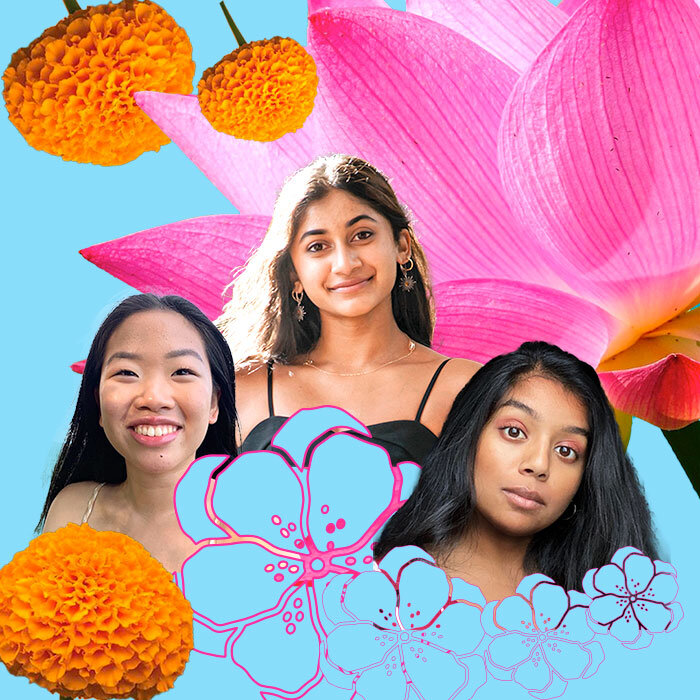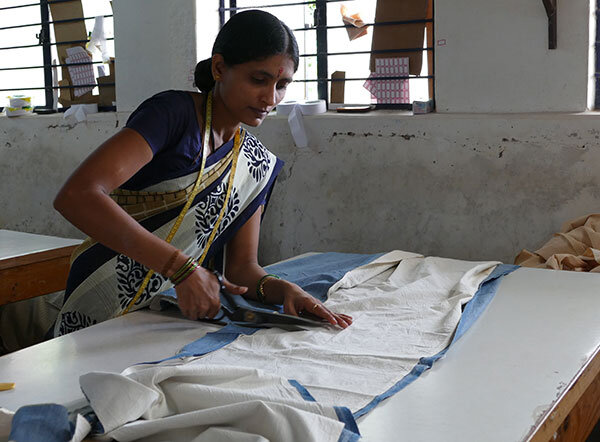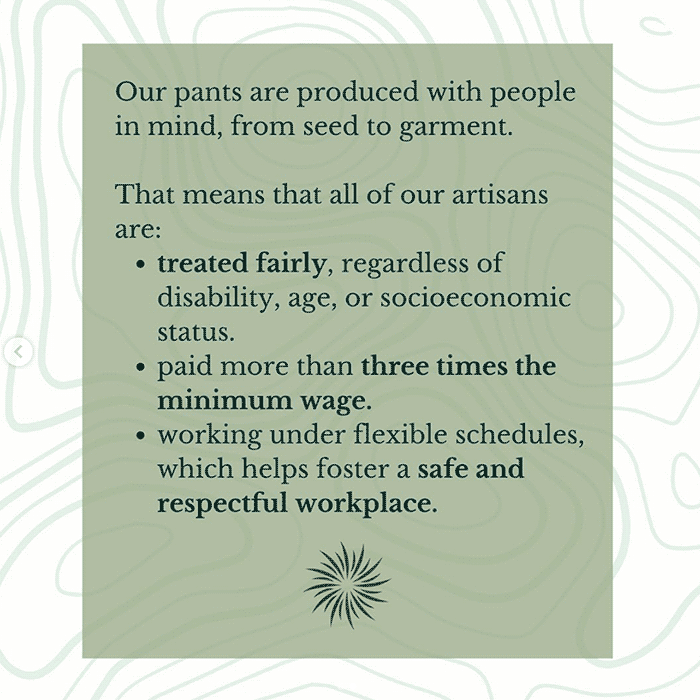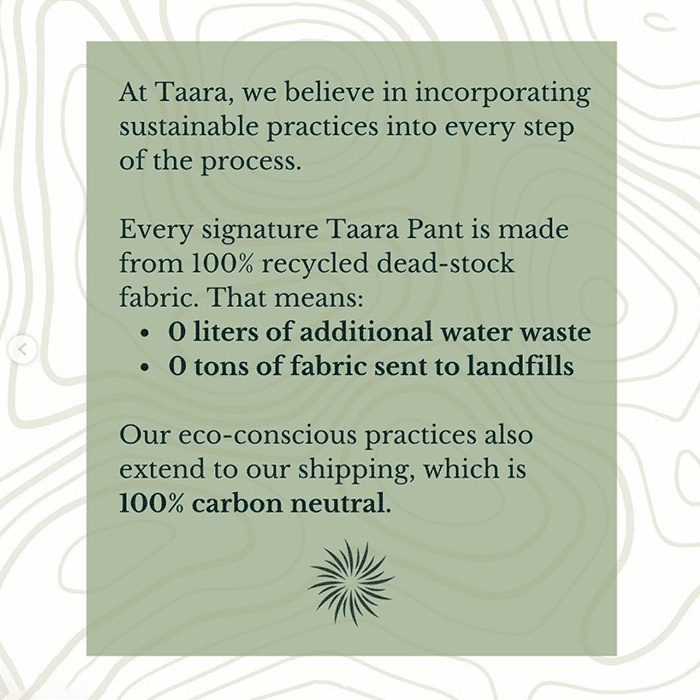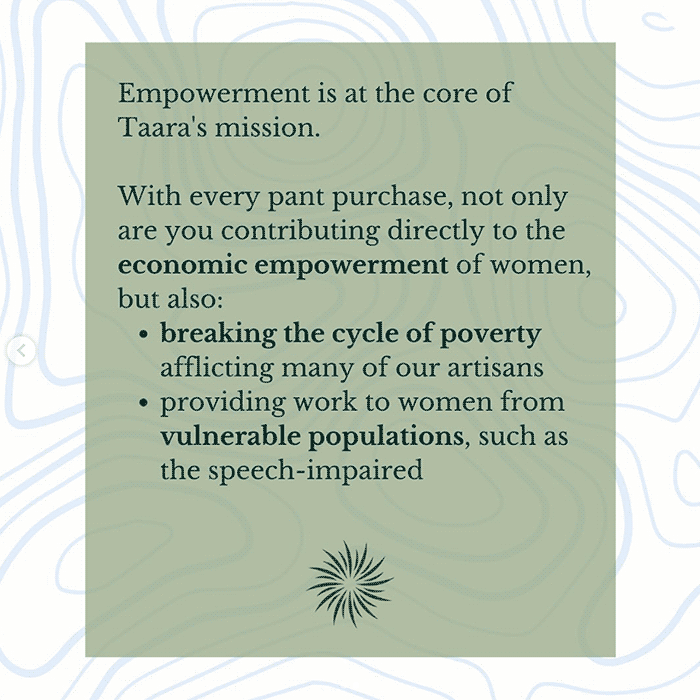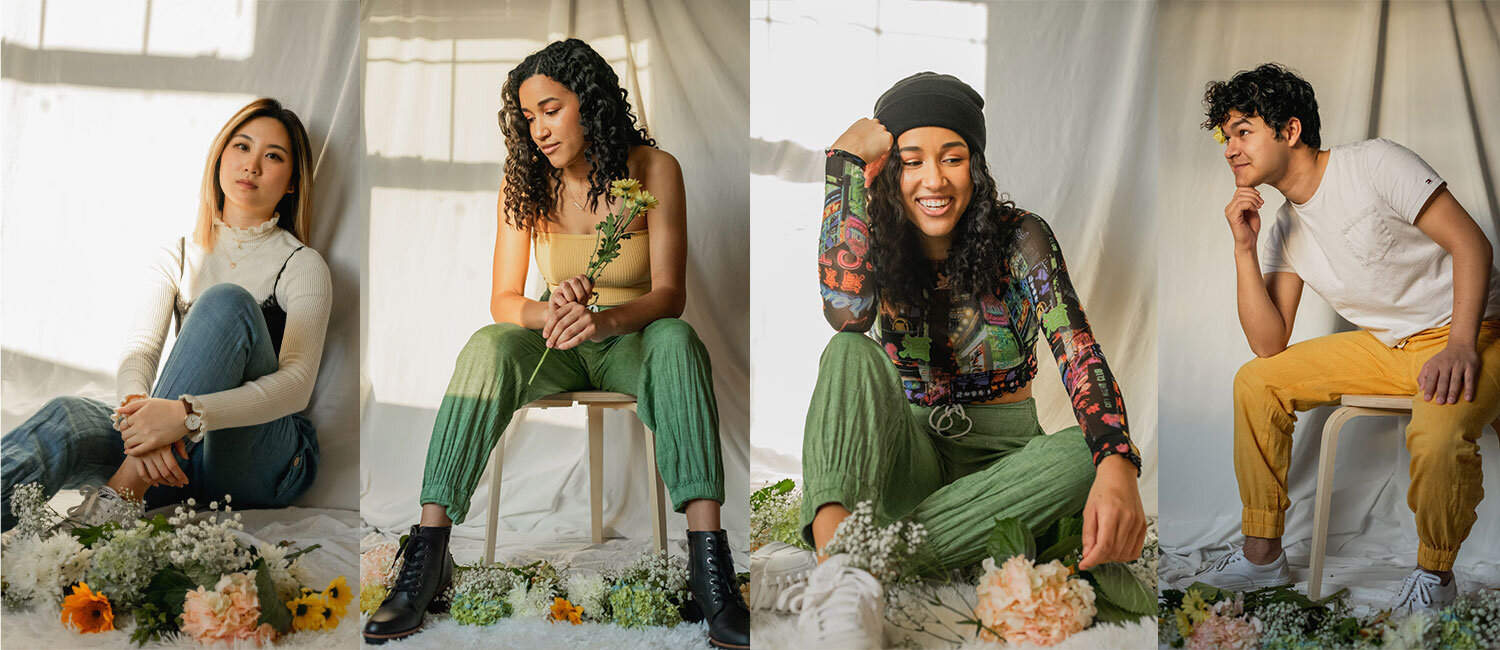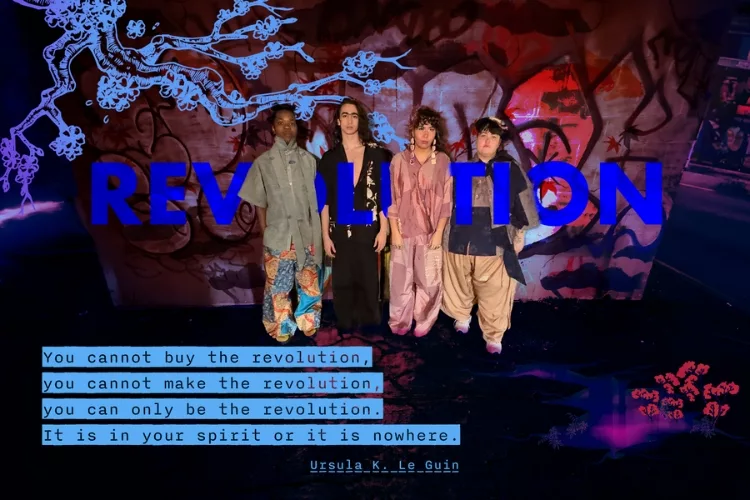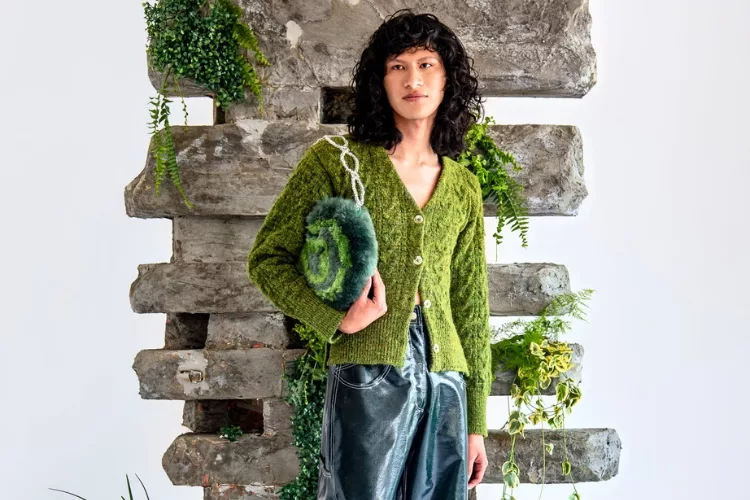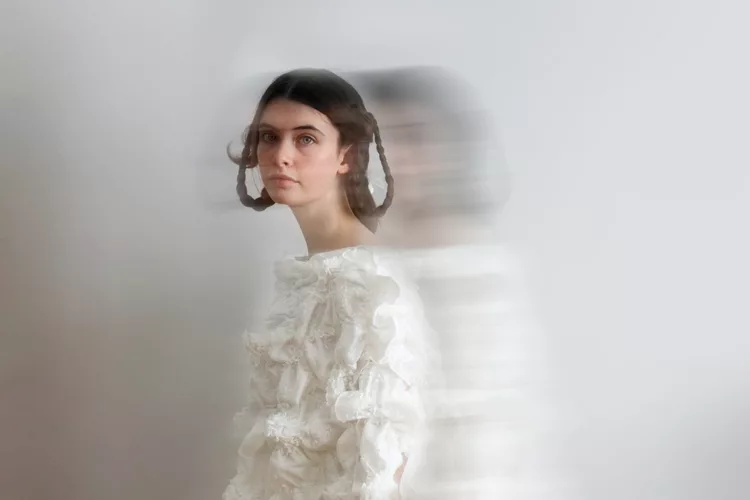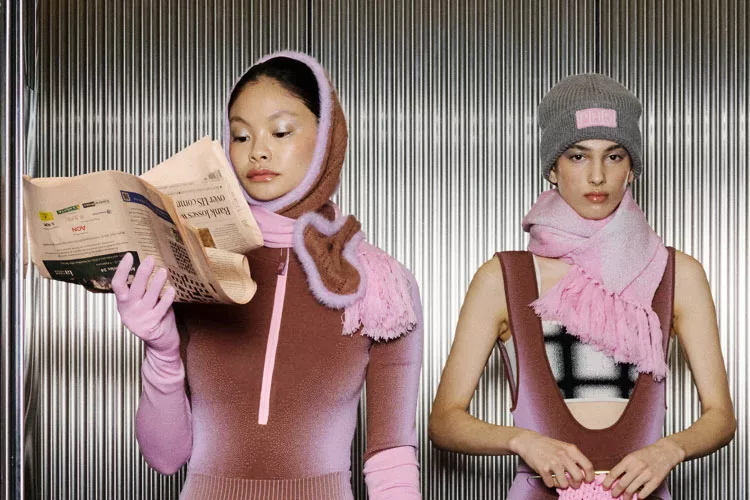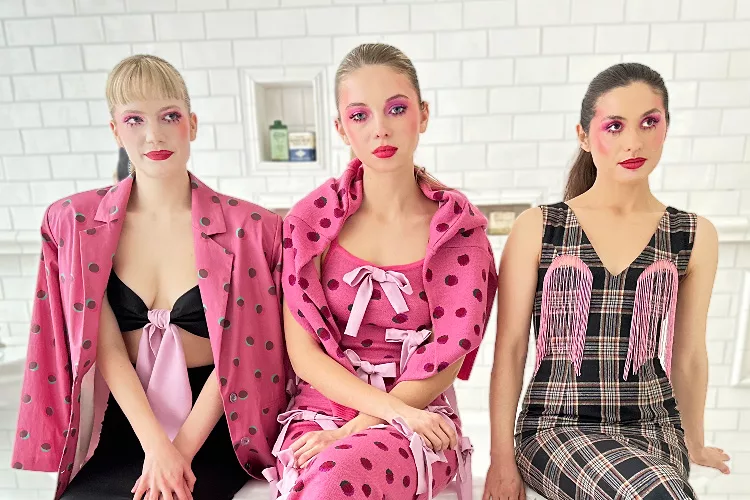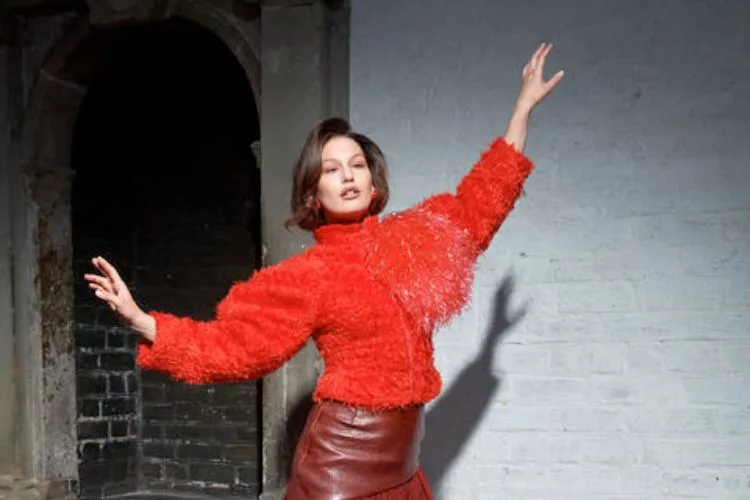Taara Projects college students being the change they want to see…really!
Taara Projects started with the goal of selling sustainable clothing with the artisans who made the clothing in mind. Their main focus is to empower and pay the artisans, who make their pants, a wage that allows them to support their families. This organization was started by Shanthi Ramakrishna, currently a sophomore at John Hopkins University who recruited several ambitious women to join the team. They champion ethical practices, transparency, and sustainability and has a message that resembles that of the #payupfashion campaign and The Remake organization. The #payupfashion campaign fights for women garment workers to receive a fair and livable wage. The Remake organization encourages individuals to buy better and think about where their clothes are coming from and the women who are making them. The Taara team, (Hopkins students from diverse disciplines,) strives to make the fashion world a more eco-conscious and livable place.
We had a Zoom chat with Shanthi along with Keerti Soundappan, the director of communication and outreach and Michelle Tu, director of publicity and marketing for the brand.
Taara Project feels both fresh and necessary – can you go into details about it?
Shanthi – Sure… Taara Projects operates on three pillars: ethicality, transparency, and sustainability. In all, Taara Project’s goal is to have a completely sustainable supply chain from production to distribution all while economically empowering artisans who are at risk for poverty in India. What sets us apart from other sustainable small businesses in the fashion space is our commitment to paying artisans a living wage. The heart of our mission is to uplift artisans who already have amazing pre-existing skill sets. And then by paying a living wage they’re able to afford to elevate their skills even more.
How did you get started? What was the process like?
Shanthi – I started it in 2018 –very unofficially– in my senior year of high school. I just happened to go to India in the summer to visit some family. I wanted to get a pair of pants made especially for me and my mom said, “bring some back for your friends”. She loves when I bring things back for my friends from India.
I ended up having 20 or 30 pairs of these simple pants that I had designed. I brought them back and basically just sold them to my classmates. Total word of mouth marketing –very casual and people really liked them. We donated 100% of the proceeds to charity and nonprofits I had worked with. I thought that would be the end; I wanted to move onto something else. But, after coming to Hopkins it just kind of naturally revitalized itself – I can’t even explain how. We had already made connections in India and had somewhat of a mission at this point. I realized that if I could form a team I could take Taara to a place that I wasn’t able to get to on my own. The story officially starts at Hopkins.
Keerti – To add to that, the story of how Shanthi came about the opportunity to support these businesses and artisans in India is personally very inspiring to me. When she made these pants in India, she employed this one artisan who was in a small village. He was the breadwinner for his family so this work meant a lot to him. Even the 20 pairs of pants that he made meant a lot to him. Shanthi recognized that this was a problem across India. This wasn’t just one person. There are these people who have these amazing skills that aren’t being paid enough to support their families. I think that’s important to recognize. It’s a big reason why Taara exists today.
Shanthi – Definitely. Mr.Ashwat worked as a tailor in a shop the size of my dorm room along with his wife and his daughter. He just busted out like 20 pairs of pants and they were amazing. We paid him well over a living wage at that point.
“The concept of economically empowering someone is about elevating the potential they already have. We are just complementing what the artisans already possess which is immense skill and talent. Because of systemic injustices in India and even here they aren’t being compensated fairly. ”
Ethics
Going off of that, what are a few things you’ve learned throughout the process of getting Taara Projects moving?
Shanthi – I think the biggest thing I’ve learned is to become almost numb to rejection and failure because one of the biggest things was grant funding. At the start, we needed money to make these pants –we have our mission, we have our values and we have structure so it comes down to the funding. For a while, it just wasn’t happening. I remember the first time we were accepted to one of the grant funds and it was such a happy day! I feel like the biggest lesson throughout all this is not to be discouraged – even if you’re met with failure. You have to keep going if you really believe in the mission and a team of amazing people who also believe in it with you.
Michelle – Something I’ve learned is that I think it’s important to have passion –that’s what keeps us going. Sometimes it’s difficult because we are all students and we have other things going on, but because we are all so passionate about the mission of Taara – anytime we meet it’s really inspiring. We all just get excited about the message again and realize that we all need to push forward, sell these pants, and help out these artisans. So yeah, I think passion is important within any brand that you’re working on.
Keerti – I think that’s a great point and that was kind of the point I was going to make. For me, it’s hard to think that a group of college students could make such a difference in people’s lives. If this is all that it takes to make a difference in people’s lives then why isn’t a bigger organization doing this? Why isn’t the government doing this for these people? That goes back to systemic injustices that exist in India and in other countries –in America too.
“I think it’s important to remember that we truly have the resources that can make the difference that needs to be made in the world. Not to put that on as like a savior complex or anything –I just mean realizing that I’m capable of more than I think I am. ”
Eco-consciousness
Who have you found to be influential?
Shanthi – For me personally, it has truly been the artisans that I worked with at the start like Mr. Ashwat. We also sourced our fabric from this village that’s about six hours from the main city and it was from a woman’s co-op. They basically train women in weaving and looming along with natural dyeing skills. These women can then go on to run their own businesses and sustain themselves. Interacting with the women there and interacting with Mr. Ashwat have been the most memorable things for me. The first official batch of clothing that we are launching this month has all been done remotely. We haven’t had that face-to-face interaction. Nevertheless, I think the people involved have been the most influential.
Michelle – To be honest for me, this is really cheesy, but I think I’m most inspired by Shanthi because she’s 19 years old and she started this brand in high school. She built it up all by herself –she brought it to Hopkins and we all joined, but this is her brand. She created this by herself and it’s so powerful to see a woman of color having this brand and then recruiting us all to join. I’m just really excited to get the word out about Taara because it’s so incredible and it wouldn’t have happened without Shanthi.
Shanthi – Thank you! that was too sweet. It would have come up at some point, but, yes, some of the most inspiring people to me are my teammates. I truly wouldn’t be here without them.
Keerti – I don’t know how to follow that up! I definitely feel like my team inspires me every day. Like Shanthi said, we don’t get to see these artisans in person. We hear things through the people who are working with them in India. It’s easier to make connections with them in person, you know? It’s inspiring to hear how we are making a difference and how the artisans are personally taking advantage of the opportunities they have and working toward a better life for themselves. However, day to day it’s really my teammates who keep me going. Very candid, but a lot of times in college people just do things to put it on a resume. I feel that our team is truly passionate about what they’re doing and that’s what makes it worth it for me beyond what the actual mission of Taara is.
Empowerment
Do you each have a moment that was particularly successful to you?
Keerti – This is hard because we’ve made a lot of progress in a short amount of time. Me and Michelle work together on a lot of social media things and one of the biggest things was when Aditi Mayer reposted something of ours. I was blown away because she’s pretty big in sustainable and ethical fashion. She talks about a lot of hot topic issues especially in India and South Asia. The fact that she even recognized that we are doing good work was amazing. People are recognizing what we are doing and it’s not just our classmates.
Michelle – I was going to say the same thing, I was thinking about that. Keerti is an incredible artist and we have been spotlighting women in sustainability that we think are important through a social media series. We did Aditi Mayer first and it was the first time we had gotten recognition from someone who has sway and presence in the industry. We were all freaking out when this happened. I sent a screenshot in the group chat and we were all just like, “Oh my god this is so exciting!” Then Leah Thomas (@greengirl) reposted us. Those were both big moments for us – getting recognized.
Shanthi – Both of those had us fangirling so hard. Keerti made some beautiful drawings and we weren’t expecting anything, but then they reposted them and we were all going a little crazy. I was driving my roommate and my friend to DC and I had gotten an email that said we had been accepted into Social Innovation Lab accelerator. They have a reputation of being pretty selective. I remember being really excited because it was the first big program that Taara had become a part of. I knew it would be instrumental in taking us further and it also came with grant money so I was like, “Yes! We have money! We have support!”
What’s something that’s been an ongoing struggle for you?
Keerti – We pride ourselves on being completely sustainable and ethical –we think that being a sustainable brand is a no brainer, like why wouldn’t you do that? It’s hard to get our name out there when there are so many small businesses coming up and saying they are sustainable. A lot of these brands aren’t actually sustainable, but who is really going to put in the work to see if they’re truly being sustainable and ethical?
It’s hard for us to figure out how we can convince people that we truly are, how do we show them that we are sustainable? It’s been a struggle reaching out to people and also learning how to truly brand ourselves as ethical. A lot of the brands that we compete against are half fast fashion. They put out a lot of products that are “trendy” –they try to keep up with the pace of things. We are sticking to our mission more than giving people trendy clothing.
Shanthi – I think one of the biggest challenges is the fact that Taara’s second life has been during the pandemic. I formed the initial team in mid-February of 2020 and then we were all kicked off of campus in March. Since then, building the team dynamic, recruiting, establishing a partner in India that we are now working with to produce our next batch of pants has all been done remotely. I haven’t even met some of the team face to face yet. It’s been a very unique experience…I’m not going to say it’s all bad. We’ve definitely been able to make it work for ourselves. It has been a struggle coordinating with Zylk – the brand we are working with abroad. The virtual environment has its tricky parts.
Michelle – Yeah, I agree. I think one challenge we had was figuring out our brand identity. Shanthi mentioned the three pillars – sustainability or eco consciousness, ethicality, and empowerment\transparency. Last week we had a team meeting and we kind of consolidated the idea that we want to focus on empowerment and we want to put the artisans at the forefront of our story. That was difficult because I think we were unclear about it. On our social media I’ve been highlighting a lot of our sustainability initiatives. I had to shift our narratives to the artisans -–in terms of paying them a living wage.
Models wearing Taara pants
Final thoughts?
Keerti – We’re really proud of being a completely student run and women run organization. Our experience being in this demographic has helped us bond –it’s why we work so well together. I wanted to also emphasize the fact that while we do support these artisans by providing them with a job, we pride ourselves more on being able to give them a living wage. Our goal is to provide them wages so they can support a family of four. We want them to be able to support their families, but also provide them with more mobility in the workplace so they don’t just have to stay with Taara the entire time to find that living wage.
Shanthi – Michelle and I were in a meeting this morning with a branding agency and we asked him just from the outside perspective “What makes Taara different?” and he said a lot of small businesses will have the sustainability element down, but not a lot of small businesses will have the supply chain that will also economically empower artisans with a living wage. We are dedicated to that whole heartedly. We have our product launch coming up at the end of March. A batch of 105 pants in 6 different colors and 3 different sizes.
Thanks for sharing your story with No Kill! We’re excited by your work and think our readers will be too!
Check out their website and instagram
(top image L-R Michelle, Shanthi, Keerti)
–Madison Hartz

